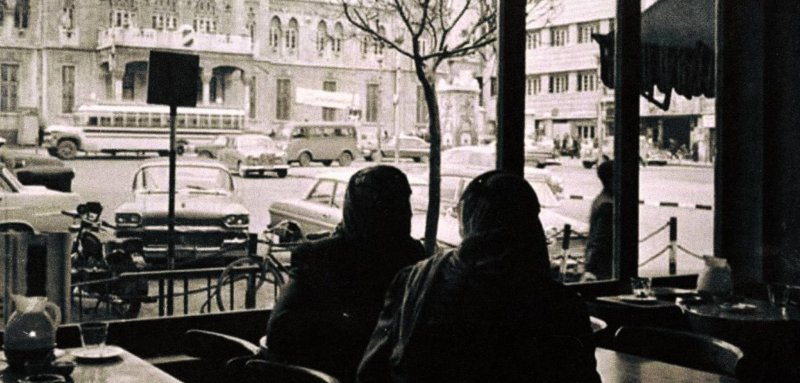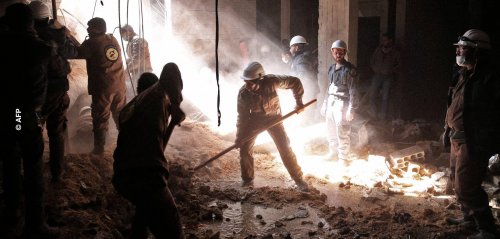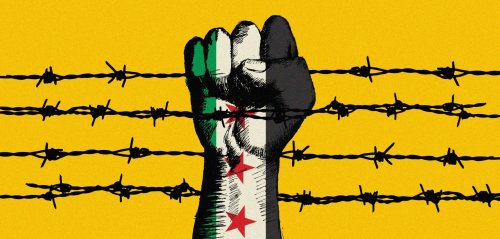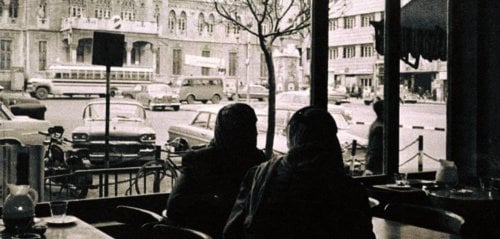- Al-Hijaz Café... Do you know it?
- I’ve heard of it
- It used to be here, once
- Where?
- Here...
He pointed to the empty space where “Nirvana” pillars had begun to be erected. Noise topped by more noise, protesting and grief, then a final good-bye to the “popular café” without a funeral, and without reciting al-Fatiha in memory of the souls of the victims who used to frequent the place. They were many, both different and the same, fleeing from the Palace of Justice, withdrawing, starting their lives and ending them. A new crime was added to the list, and it was committed in murderous silence, in broad daylight. You are then forgotten as if you were never here, did not pass by, did not climb the narrow staircase, did not greet the people, comrades, and passersby, and did not sit in your usual chair talking to the latest patrons and friends; Hassiba Abdel-Rahman, Abdullah Fadel, Fadel Al-Fadil, Adel Mahmoud, Sami Al-Takween, Mohammad Sayed Rasas, and Fateh Jamous. You did not turn around to eavesdrop on the history of “Damascus, Najd, and Oman”, narrated by the station’s stopped train, the water from the cut-off path, and Lawrence’s Seven Pillars of Wisdom (autobiographical account of the experiences of British Army Colonel “Lawrence of Arabia”).
Damascus pampered and spoiled its own people in a beautiful way. Throughout its history, it kept cafes for its residents and visitors, when its main streets of “Baghdad” and “Abed”, its old markets, and the banks of Barada River were still bustling with popular cafes. At that time, and specifically during the sixties, the role of a café went beyond mere gossip, entertainment, and drinking tea. It was for discussing the matters of work, professions, culture, and politics. For instance, this is the carpenters’ café, and that is the café of bakers and millers, and another is for workers, laborers and bird sellers. Whereas these cafes — the cafes of “Brazil”, “Al-Kamal”, “Havana” and “Al-Rawda” — were set up for politicians, intellectuals, writers and novelists. And this is the “Allah Kareem” (meaning God is merciful) cafe for optimists who stand by the phrase, “Tomorrow is better”. That is the “Khursan” cafe for the deaf and mute, and that is the “Al-Taybin” cafe for the weak hearted, and the “Khod Alik” cafe for the jokers, jesters, and those who love life, in addition to the “Khabbini” cafe for those that are obsessed with the Ottoman fez, or tarboosh. The “Al-Diriya” cafe is for those coming from Deir ez-Zor, and the “Qalamoun” cafe is for those coming from the Al-Qalamoun region. All this so that if you came to Damascus looking for an acquaintance or someone you know, you would go to the cafe that belongs to those from your region or profession.
In the sixties, the role of a café went beyond mere gossip, entertainment, and drinking tea. It was for discussing the matters of work, professions, culture, and politics. The end of Al Hijaz Café
The war fueled the collapse in Syrian society, thus strengthening market values and business at the expense of identity and memory, and increased the power of the ‘nouveau riche’ (the newly-rich). As for the state of “observing” the ongoing devastation and ruin, it has settled, prevailed, materialized, and created a stimulating environment for opportunists and their influential partners to double the destruction and demolitions, since the country has already ‘gone with the wind’, and life continues at a pace much faster and higher than one can bear or comprehend. The taxes that were spared by the war were not only limited to people’s lives, but also exceeded them to pump plumes of smoke that did not clear until a brand “new al-Sham” was revealed. In this new land, there is no place for ancient memory, nor a place for a table that takes you to a colorful Syria, in which there’s a “one Arab nation” and a “long live Syria”. Well, everything is over and done, you will no longer be ashamed of your nudity, Syrian. If you did not die in the war, you will die in life. You only live to sleep, and then you wake up and try to avoid all the reasons that push you to commit suicide. The sound of the cannons and artillery will reach you, as if to say, “I am far away, but I am still there.” You are silent after that, and you smile at that stranger whose face you will not have time to familiarize yourself with, because the excavations, bulldozing, and demolition have begun. And the people in charge of the project announced that the areas of destruction across the country have lessened, and the heavenly space of Al-Hijaz is the only one left to be replaced with “Nirvana”, which brings a good annual income for its owners — something that neither the chairs of the Al-Hijaz nor its dirty tables could provide.
“If you did not die in the war, you will die in life. You only live to sleep, and then you wake up and try to avoid all the reasons that push you to commit suicide”
The last remaining space with oxygen went to the center of the city. The “refuge and cover” went to those who want to escape the slow advance of five stars places. “Al-Hijaz” is gone forever, and with it also went the luxury of the time that we had to waste. We were reassured that the little money we had is more than enough, and will not make us feel embarrassed, or make us reach into our pockets with trembling hands when the time to pay comes. Complete and abundant freedom as well as political colors are gone. You will no longer tell jokes out loud for your neighbors to hear, and you will not laugh at them. You will not be proud of the simplicity of “Al-Hijaz” that had beaten the luxury and splendor of Geneva and its heat that melted the frost of the city of Sochi. Shortly before the demolition, it was able to add to its tables Syrian loyalists, opponents, former prisoners, and those tired of waiting without witnessing not even once any friendly spilt blood, or a fight and a settlement, or even a withdrawal and a return. You are sitting in a small space, but it has room for the world.
Which mind is this that works and moves in such a direction?
“There is no space left for the poor in Damascus,” says writer Hassiba Abdel Rahman.
*The views and opinions expressed in this article are those of the author’s and do not necessarily reflect the official policy or position of Raseef22
Raseef22 is a not for profit entity. Our focus is on quality journalism. Every contribution to the NasRaseef membership goes directly towards journalism production. We stand independent, not accepting corporate sponsorships, sponsored content or political funding.
Support our mission to keep Raseef22 available to all readers by clicking here!
Interested in writing with us? Check our pitch process here!









